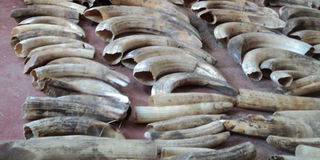Prime
Conservationists ask govt to reverse legalised wildlife trade

Some of the recovered ivory and hippo teeth. PHOTO/FILE/ENID NINSIIMA
What you need to know:
- But Uganda Wildlife Authority (UWA), challenged the allegation, saying the licensed traders are closely monitored to ensure they only sell animals they have bred in regulated facilities.
The World Animal Protection (WAP), an international organisation promoting animal welfare, has said the legalisation of wildlife trade by government is increasing threats of extinction of important wild animals.
But Uganda Wildlife Authority (UWA), challenged the allegation, saying the licensed traders are closely monitored to ensure they only sell animals they have bred in regulated facilities.
Speaking to journalists on Friday in Kampala, Ms Edith Kabesiime, the WAP’s wildlife campaign manager for Africa, said the legally traded animals in Uganda are sourced from forests.
“There is evidence that people have found a way of going around with legal trade to exploit wildlife. People forge Convention on International Trade in Endangered Species of Wild Fauna and Flora (CITES) exports certificate,” she said.
She added: “People will capture animals from the wild whereas they are advised to only trade on those that are raised in captive facilities. In a way, the wild remains the source of refill for facilities that breed animals.”
The United Nations General Assembly (UNGA) on December 20, 2013, at its 68th session, proclaimed on March 3 – the day of signature of the CITES in 1973 – as UN World Wildlife Day to celebrate and raise awareness of the world's wild animals.
Ms Kabesiime said whereas around 50 per cent of global wildlife trade is legal, the other 50 per cent is illegal.
ALSO READ: Keep the fight to conserve wildlife
“This trade threatens conservation. It is very difficult to distinguish legal trade from illegal trade. If you meet me with a tortoise, it will be very hard to tell whether I got it legally or illegally,” she added.
But Mr Bashir Hangi, the UWA Communications Manager, challenged Ms Kabesiime’s allegations, saying they are controlling the legal traders to ensure they don’t exploit wild animals in the forests.
“We have crocodile farms which are legal wildlife. The operators have to be licensed. Others are licensed to do trade in crocodile eggs. We keep monitoring the farms and we do physical counting to know the stock,” he said.
This is coming three months after Maj Joshua Karamagi, the manager for investigations at UWA, said they are registering increases in the reported number of wildlife crimes.
“We have done some good work in fighting wildlife crime since I joined UWA in March 2018. In 2018/2019, we handled 475 cases with 525 suspects. And out of these suspects, 395 were convicted and sentenced [in courts of law],” he said.
He said in 2020, they handled 784 cases but “in 2020/2021 we handled 790 cases with 1310 suspects.” “We reached a conviction rate of 22.6 percent and prosecution rate of 55 percent. All in all, since 2018, we handled 2236 cases with 3455 suspects,” Maj Karamagi said.
The country’s rich biodiversity has remained one of the major drivers of high foreign exchange earnings through tourism. Although the Covid-19 pandemic has interrupted the tourism sector.
Uganda, according to a report by TRAFFIC, a global conservation agency, hosts 53.9 percent of the world’s remaining population of mountain gorillas, 11 percent of the world’s recorded species of birds (50 percent of Africa’s bird species), 7.8 percent of the global mammal diversity (39 percent of Africa’s mammals), 1,249 recorded species of butterflies and 600 species of fish, among others.




